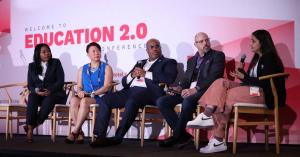Education 2.0 Conference Highlights How Online Reviews Mislead Students & Parents
Education 2.0 Conference 2025 will spotlight how misleading online reviews impact student choices, urging smarter, research-driven educational decisions.
DUBAI, DUBAI, UNITED ARAB EMIRATES, June 23, 2025 /EINPresswire.com/ -- The upcoming Education 2.0 Conference, scheduled from December 8–10, 2025, at the InterContinental DFC, Dubai, UAE, is set to focus on a growing concern affecting students and parents worldwide: the reliability and impact of online reviews on educational decisions. With an increasing number of families turning to digital feedback for guidance on schools, colleges, and learning programs, experts warn that these reviews can sometimes be misleading, resulting in misguided choices and unintended consequences.The three-day summit will gather educators, policymakers, digital platform experts, student advocates, and parents to examine how online reviews have transformed education selection and the potential pitfalls that come with this trend. By addressing the nuances behind educational reviews, the Education 2.0 Conference aims to equip attendees with better tools to critically evaluate information and avoid being swayed by partial or manipulated opinions.
In the digital age, online reviews have become a key influence in shaping perceptions of educational institutions and services. From rankings and star ratings on dedicated education platforms to comments on social media and forums, these reviews often represent the first source of information for prospective students and their families. However, the Education 2.0 Conference highlights that these user-generated reviews are frequently subjective, incomplete, or even intentionally distorted, and relying solely on them can lead to choices that fail to meet the unique needs and expectations of learners.
One of the primary issues discussed will be the inherent bias within reviews. Negative reviews tend to attract more attention due to their emotional impact, while positive experiences may be underreported. This imbalance can distort the true picture of an institution’s quality. Furthermore, many reviewers focus on isolated incidents rather than the overall learning environment or academic standards, which can unfairly tarnish reputations or create unrealistic expectations.
Another emerging challenge is the presence of fake or incentivized reviews. The education conference will address this issue, considering that education programs or third parties may solicit positive feedback or attempt to suppress negative opinions in order to improve their online image. Conversely, competitors or disgruntled individuals might post misleading negative comments. Such manipulation undermines trust and complicates the decision-making process for students and parents.
Experts attending the conference will share research findings, case studies, and real-life testimonials from people who have experienced the consequences of over-relying on online reviews. Many recount situations where decisions based on glowing or damning reviews resulted in financial strain, academic dissatisfaction, or emotional distress. These stories highlight the need for more comprehensive evaluation practices that consider multiple sources of information.
To counter these challenges, the upcoming education summit advocates a more holistic approach to educational choices. Attendees of the Education 2.0 Conference can expect to learn strategies for combining reviews with direct engagement methods such as campus visits, interviews with faculty and current students, and thorough investigation of institutional accreditation and performance metrics. This multi-dimensional assessment empowers families to make balanced and personalized decisions.
Additionally, the conference will explore technological innovations designed to improve the quality and reliability of online feedback. Discussions will include the role of artificial intelligence in detecting patterns indicative of fake reviews, sentiment analysis tools that differentiate between constructive and biased feedback, and platforms that prioritize verified user experiences. While technology offers promising support, experts stress the importance of human judgment and critical thinking as complementary tools.
“Online reviews are a double-edged sword. They democratize information, but also risk misleading vulnerable families, who may make life-changing decisions. Our aim is to promote greater awareness about these limitations and promote legitimate ways to evaluate educational opportunities,” said Sai Narula, Manager at Education 2.0 Conference.
Beyond the immediate focus on reviews, the education summit will also touch on related themes such as digital literacy for parents and students, ethical standards for educational marketing, and the promotion of transparency across all education sectors. These discussions aim to build a culture of trust and accountability that supports students’ academic success and well-being.
The conference’s agenda is designed to promote collaboration across academia, government, technology providers, and consumer protection agencies. By sharing insights and best practices, participants hope to establish guidelines and frameworks that enhance the integrity of educational information available online. This cooperation is essential in an era where education options are increasingly diverse, from traditional institutions to online platforms and hybrid models.
Ultimately, the event seeks to empower students and parents to navigate the complex educational landscape confidently. By shining a light on the pitfalls of online reviews and encouraging a more thorough decision-making process, the Education 2.0 Conference aims to promote outcomes that align with students’ goals and support lifelong learning.
About Education 2.0 Conference
The Education 2.0 Conference is a leading global education event that brings together education professionals, policymakers, students, and families to discuss emerging challenges and innovations in education. With a focus on empowering learners and improving transparency and integrity in education, the conference covers a wide range of topics, including digital transformation, ethics, equity, and emerging technologies. Attendees are also encouraged to explore best practices to identify and report a scam, especially in the evolving digital education landscape. For more details, please visit www.education2conf.com.
Bhawna Banga
Education 2.0 Conference
email us here
Visit us on social media:
LinkedIn
Instagram
Facebook
X
Legal Disclaimer:
EIN Presswire provides this news content "as is" without warranty of any kind. We do not accept any responsibility or liability for the accuracy, content, images, videos, licenses, completeness, legality, or reliability of the information contained in this article. If you have any complaints or copyright issues related to this article, kindly contact the author above.

